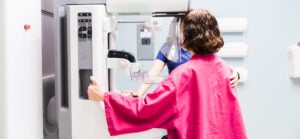Breast Imaging
Our program has unfilled positions for the 2026-2027 breast imaging fellowship year. Please see below on how to apply.
For those interested in advanced training, the University of Virginia’s Division of Breast Imaging offers qualified physicians a one-year non-tenured breast imaging instructorship. Candidates must have an MD or equivalent and have successfully completed a residency in diagnostic radiology at an ACGME-accredited institution.
Our post-graduate fellowship program focuses on all aspects of breast imaging, including clinical consultation, screening and diagnostic mammography, breast ultrasound, breast MRI, contrast enhanced mammography, galactography, and image-guided interventional procedures. Core biopsies are performed under ultrasound, stereotactic, tomosynthesis, contrast-enhanced mammographic, and MRI guidance. In addition to gaining further expertise in this subspecialty, fellows will serve as junior faculty and play a significant role in resident education.
Fellow Testimonials
“This program provides superb training with exposure to all modalities along with fantastic technologists and excellent surgical colleagues, all centered within beautiful Charlottesville.”
“I really appreciate the very organized working and teaching environment in this fellowship, with current information and the latest technology.”
“I am very happy that I chose UVA for my breast imaging fellowship. You are able to train under nationally renowned faculty and see a high volume of cases. I feel that I will be very well prepared for either an academic or a private practice setting.”
UVA Health is a large tertiary care center in central Virginia. The Breast Imaging Division of UVA Health provides the highest quality care with modern technology at the UVA Breast Care Center in Charlottesville, VA. Our division of fellowship trained physicians are leaders in the field, engaging in national research and passionate about teaching radiologists in training.

The overall goal of the Breast Imaging Fellowship Program is to fulfill the threefold mission of University of Virginia Health: To provide excellence and innovation in 1) the care of patients, 2) the training of health professionals, and 3) the creation and sharing of health knowledge.
To that end, the program is designed to enable the Breast Imaging Fellow to accumulate a broad base of medical knowledge, to develop progressively independent interpretive and technical skills under supervision, and to become proficient at accurate clinical decision making and consulting. The fellowship aims to provide teaching and research opportunities for fellows, adjusted to special interests and talents.
As a result of our clinical training and didactic conferences, we expect each Breast Imaging Fellow who finishes training to be able to:
- Be conversant in the BI-RADS lexicon, including the mammography, ultrasound, and MRI sections
- Perceive breast masses, calcifications, and other abnormalities on mammography and determine probability of malignancy; develop an accurate differential diagnosis based on the imaging findings
- Determine appropriate management of mammographic, sonographic, and MR breast abnormalities
- For both standard and problem-solving mammography, describe the technique for obtaining the images, the correct terminology, and the appropriate applications
- Perform breast clinical examinations and correlate with problem-solving mammography
- Perform and interpret breast ultrasound examinations
- Interpret breast magnetic resonance imaging studies; recognize common MR artifacts that affect breast imaging
- Perform and understand the indications and complications of breast interventional procedures including: needle localization using mammographic, stereotactic, ultrasonographic, or MRI guidance; cyst aspiration; fine needle and core needle biopsy with stereotactic, ultrasonographic, contrast enhanced mammographic, or MRI guidance; galactography
- Understand the psychosocial concerns of patients undergoing breast imaging and learn how to deal with these issues; be able to talk with patients who’ve been diagnosed with cancer in an appropriate, supportive manner
- Become familiar with breast pathology and the clinical significance of various benign and malignant lesions
- Understand risk factors for breast cancer, including genetics, and implications for screening mammography, ultrasound, and MRI; be familiar with common methods for measuring breast cancer risk
- Become familiar with community education programs regarding breast cancer awareness
- Determine the elements of quality control and quality assurance programs in Breast Imaging, including the criteria necessary for high quality mammography, breast ultrasound, and breast MRI and the technical problems that impact image quality
- Become familiar with breast imaging literature and current research
- Interpret bone density examinations; understand the basic concepts of etiology, prevention, and treatment of osteoporosis
At the conclusion of the fellowship, the graduate will have the foundation to build an academic career in radiology, advance subspecialty knowledge and skills as an advanced clinical fellow or instructor, or enter community practice as an expert in breast imaging.
Call
Fellows are responsible for at-home pager call related to breast imaging. This could include providing after-hour reads for inpatient or Emergency room breast ultrasounds or answering patient calls regarding any difficulties or complications after percutaneous biopsy. They are also available for emergent breast drainages that have to occur in the evening or on weekends. There is currently no mandatory ER or body call.
Conferences
The fellow’s conferences include weekly multidisciplinary breast tumor board (Every Friday 1:30-3:00 PM). The entire breast cancer clinical team (Radiology, Pathology, Surgery, Medical Oncology, Radiation Oncology, and Genetics) discuss the breast cancer patients that the clinics have seen that week. The fellows participate by presenting the imaging for all the new patients.
Electives
Fellows have 4 weeks of elective time. Electives are typically based on your employment plans following fellowship. Fellows entering private practice with general radiology responsibilities often want more diagnostic radiology experience in other radiology divisions. Fellows entering academics or a private practice job that is exclusively breast imaging may choose to have a weeks with pathology, surgery, radiation or medical oncology or spending time performing research or creating educational material. Electives will take place January-June.
Teaching
Fellows will be expected to assist in teaching of medical students and residents rotating in on the Breast Imaging Service.
Fellows are provided with written evaluation of their performance four times during the program. The faculty performs evaluations of the fellows’ performance at 3, 6, 9, and 12 months.
Anonymous evaluations by the fellows of the program and are received twice per year and faculty evaluations are completed quarterly. Faculty are evaluated using a numerical scoring system on a wide variety of clinical, teaching, and research skills through New Innovations.
Moonlighting
The UVA Department of Radiology and Medical Imaging offers internal moonlighting involving the interpretation of overnight ED studies. Most MSK and some other clinical instructors participate, but it is completely optional for breast fellows. Participating instructors are given a home workstation, which allows for this coverage to largely be done from home if desired. Participants are also pardoned from regular daytime clinical duties. Subspecialty faculty are available for backup coverage should a question arise overnight. Various advanced imaging studies or complicated cases where a subspecialty read is necessary can receive a preliminary report overnight with final read by a subspecialty attending in the morning. Subspecialty services are also available for urgent overnight procedures, such that the clinical instructors can focus on diagnostic studies. The program has helped our fellows to maintain and further develop general radiology skills for both boards preparation and practice, while also increasing their confidence in independent image interpretation. Notably, contributing to this coverage also supplements income by approximately $15,000 / week.
Clinical and Research Work Environment
The Division of Breast Imaging has a strong research program. Our interests are diverse, ranging from clinical to basic science studies. Our current research projects include contrast enhanced Mammography, radiology/pathology management, quality assurance, and education. Our division is currently participating in the Tomosynthesis Mammographic Imaging Screening Trial (TMIST) run by the ECOG-ACRIN research group. The study plans to be one of the largest multicenter prospective randomized screening trials. Our division is also participating in the Contrast Mammography Imaging Screening Trial (CMIST) run by the ECOG-ACRIN research group. In this study, women with dense breasts undergo both tomosynthesis and contrast enhanced mammography for screening. The two studies are individually read and their performance will be compared between the two modalities across multiple centers nationally and across multiple years.
Several of our attendings have a strong interest in global health initiatives. They have been participating with the RSNA Global Health Learning Center in establishing and assisting with the Women’s Imaging Fellowship at the Muhimbili University of Health and Allied Sciences (MUHAS) that includes trips to Dar Es Salaam, Tanzania throughout the year. Fellows who exhibit a strong motivation to participate may have the opportunity to join our attendings on a trip to Tanzania during their elective time.
Our previous fellows have enjoyed participating in one or more projects and have presented their work at various conferences and professional gatherings during their fellowship.
UVA Health is a large tertiary care center in central Virginia. We provide screening and diagnostic mammography, as well as the full range of breast procedures. Mammography is performed at three sites, one of which is staffed by radiologists.
 UVA Breast Care Center, Pantops (opened October 2020)
UVA Breast Care Center, Pantops (opened October 2020)
- Main site of operations
- All digital operation
- Five mammography units, including one GE Senographe Digital unit and four Hologic digital units
- Hologic Tomosynthesis and Contrast-Enhanced Mammography capabilities
- Five dedicated Siemens breast US units
- Upright Hologic stereotactic tomosynthesis biopsy unit
- Clinic space for surgical consultation, hematology/oncology consultation, and plastic surgery consultation
UVA Education Resource Center
- 1.5T MRI scanner where breast MRI guided biopsies are performed.
- Adjacent to the UVA main hospital

Emily Couric Cancer Center
- Newly completed comprehensive cancer center
- Adjacent to the main hospital
- No breast imaging occurs at this site
Northridge Mammography
- Adjacent to Women’s Center for Midlife Health
- Two mammography units, including GE Senographe Digital and a Hologic digital units
- DEXA
- Images are transported and read at the UVA Breast Care Center
Other Screening Imaging Sites
- Fontaine Imaging Center: Seimens 1.5T Avanto and Espree MRI units. Screening and diagnostic breast MRI
- Northridge Imaging Center: Seimens 1.5T Espree MRI. Screening and diagnostic breast MRI
- Diagnostic Radiology Center in Orange, Virginia, located about 40 minutes from Charlottesville (not staffed by radiologists); GE digital mammography unit
- Outside contracts for mammography reading, including Fluvanna Correctional Center for Women; films sent to Breast Center for interpretation
- Mobile mammography van; GE digital mammography unit
Salary, Benefits, and Academic Stipend
Our fellows receive an annual salary that is competitive with compensation offered by other institutions. They receive medical and dental care benefits for themselves and their immediate family. Additionally, malpractice insurance is provided at no charge. Fellows receive an annual stipend to cover expenses related to attending meetings or buying books. Each fellow is encouraged to attend one educational meeting of their choice.
Vacation and Leave Policy
Our Instructors have 22 days of vacation time, and 5 days of meeting time to be spent at national Radiology meetings.
Office Space
Fellows have combined office space with computers, telephones, and PACS.

Our faculty currently includes Dr. Timothy Rooney (Division Director), Dr. Jonathan Nguyen (Fellowship Director), Dr. Matthew Caley, Dr. Ramapriya Ganti, Dr. Jessie Jahjah, Dr. Natalie Cain-Wisdom, Dr. Anson Chen, and Dr. Carrie Rochman, each of whom are passionate teachers with a methodical, organized approach to both fellow and resident education. Recognizing the personal commitment required to pursue this extended training, they are firmly committed to helping each fellow excel in the breast imaging field and play a significant role in the early detection of breast cancer.
For an updated list of division and departmental faculty, click here.
Candidates must have an MD or equivalent and successfully completed a residency in diagnostic radiology at an ACGME-accredited institution or successfully completed a diagnostic radiology residency accredited by the Royal College of Physicians and Surgeons of Canada (RCPSC). Candidates must also have the ability to obtain a medical license in the Commonwealth of Virginia.
The University of Virginia Breast Imaging Division is participating in the Fellowship Match process, sponsored by the Society of Breast Imaging and managed by the National Resident Matching Program. In order to become a fellow with the University of Virginia, you must register with the Radiology Match, of which Breast Imaging is a part, at http://www.nrmp.org/.
Applying for 2027-2028 Positions
Our program complies with the timeline established by the Society of Chairs of Academic Radiology Departments (SCARD). Our program cannot accept applications or offer an opportunity to interview until November 1, 2025. Applications may be uploaded to Interfolio, but will not be reviewed until November 1.
Exceptions to the SCARD embargo include:
- Applicants whose spouse/domestic partner is also applying for a medical fellowship in the same year
• Internal candidates
• Military candidates
• International candidates – international candidates are defined as applicants from programs that are neither ACGME or RCPS programs (i.e. Canadian applicants are NOT excluded from the embargo.)
Interviews will begin January 12, 2026 and end March 31, 2026. A personal interview is required for all applicants. Interviews will be conducted virtually this cycle upon the recommendation of SCARD.
To apply for this position, please go to https://apply.interfolio.com/172549. For full consideration, applications must include a curriculum vitae; cover letter/personal statement; three current letters of recommendation; USMLE Transcript which includes Step I, II, and III scores (or equivalent); and ECFMG (if applicable).
For questions about the position or fellowship, please contact Karen Hyde at grm4na@uvahealth.org.
Applying for 2026-2027 Positions
To apply for this position, please go to https://apply.interfolio.com/152895. For full consideration, applications must include a curriculum vitae; cover letter/personal statement; three current letters of recommendation; USMLE Transcript which includes Step I, II, and III scores (or equivalent); and ECFMG (if applicable).
For questions about the position or fellowship, please contact Karen Hyde at grm4na@uvahealth.org.
Additional Information
Applications from graduates of non-US radiology programs are considered on a case-by-case basis if the duration of the completed training is at least five years, including one year of clinical training in the U.S. Please note that for international graduates, recommendation letters must be from radiologists in the U.S.
Fellows are selected on the basis of their medical training, general and academic achievements, and personal qualities. International medical graduates need to have a permanently validated ECFMG certificate and have passed USMLE I, II, and III. They will be offered a visa for the duration of their fellowship.
The University of Virginia is an Equal Opportunity employer.
For Residency and Fellowship Applicants Requiring Visa Sponsorship
Institutionally, we sponsor the J1 clinical visa. Decisions about sponsorship of other visa type are made at the department level. All graduates of international medical schools must hold a valid certificate issued by the Educational Commission for Foreign Medical Graduates (ECFMG) to be appointed as a resident or fellow following the Accreditation Council for Graduate Medical Education.
Pre-Employment Drug Testing and Background Check
Resident/fellow appointment is conditional based on the approval of the Clinical Staff Credentials Committee (CSCC) and the Clinical Staff Executive Committee (CSEC) and based on successful completion of credentialing, including but not limited to our review and acceptance of information from the criminal background check, successful completion of the pre-employment drug screen, passing applicable medical licensing exams (USMLE, COMLEX or MCCQE), receipt of a Virginia Medical License (if applicable), honest and accurate completion of all required paperwork and training modules prior to Orientation. For more information, please see the sample GME Contract linked here.
Contacts
Jonathan Nguyen, MD
Associate Professor of Radiology and Medical Imaging
Program Director, Breast Imaging Fellowship
jvn6c@uvahealth.org
Karen Hyde
Fellowship Program Administrator
grm4na@uvahealth.org
Tiffany Steward
Verification Coordinator (view more info here)
tim9t@uvahealth.org
The University of Virginia School of Medicine is accredited by The Liaison Committee on Medical Education (LCME). The University of Virginia is an Equal Opportunity employer.
